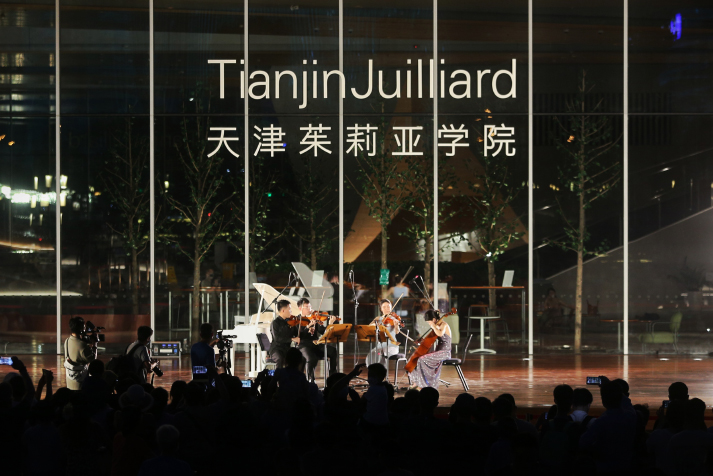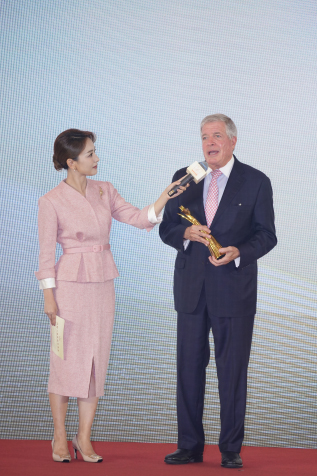| China |
| Music educator creates symphony of exchange between China and the U.S. | |
|
|
 Students at The Tianjin Juilliard School give an outdoor performance in Tianjin on July 4, 2022
In traditional Chinese culture, orchids are known as the "flower of the gentleman" and recognized as a symbol of virtue. At the same time, orchids, with their diversity and beauty, are widely distributed, and appreciated by people all around the world, just like civilizations across the world. On September 8, the inaugural Orchid Awards were presented in Beijing. Initiated by China International Communications Group (CICG) in 2022, the awards aim to recognize the contributions of people from overseas to facilitating cultural exchange and mutual learning between China and other nations. One laureate for the Lifetime Honorary Award, three for the Outstanding Achievement Award, and six for the Friendship Envoy Award were announced during the ceremony. Joseph William Polisi, the music educator who won the Lifetime Honorary Award, is a fellow of the American Academy of Arts and Sciences, and President Emeritus and Chief China Officer of The Juilliard School, a leading school of performing arts in New York. He led the school for 34 years (1984-2018), the longest presidential term in the school's history. After stepping down from his distinguished tenure in June 2018, he now supervises the overall development of The Tianjin Juilliard School in Tianjin Municipality, close to Beijing. According to the award statement, Polisi uses music to make the people-to-people exchanges between China and the United States an affectionate symphony. "The unique goals and mission of the Orchid Awards represent the highest international standards of cultural exchange and manifest the importance of ongoing communication between the people of the world to ensure harmony, understanding and peace for all of us on this troubled, yet beautiful planet," Polisi said in his speech at the ceremony. "My education in the areas of international relations and music has brought me to a lifelong quest for the understanding of diverse cultures that exist in our world. Personal contact, thoughtful discourse, and respect for our inherent differences will allow us to understand the nuances that define our individual cultural personas," he said.  Joseph William Polisi receives the Lifetime Honorary Award at the Orchid Awards ceremony in Beijing on September 8
The artist as citizen As a bassoonist, Polisi has been involved in musical performance from an early age, and ultimately decided to pursue his doctoral studies at Yale, which resulted in the conferral of a Doctor of Musical Arts degree in 1980. Music aside, he also has a background in political science—a B.A. in Political Science from the University of Connecticut, and an M.A. in International Relations from the Fletcher School of Law and Diplomacy at Tufts University. After writing numerous academic and educational articles for a variety of professional journals, and speaking frequently on arts and education issues, Polisi said he firmly believes his studies and intellectual training to complete his academic qualifications have enhanced his abilities as a performing musician and educational administrator. Founded in 1905, The Juilliard School is a world leader in performing arts education. Under Polisi's leadership, the school has grown into a globally influential provider of artistic education to musicians, dancers, actors, composers, choreographers, and playwrights. During his tenure, Polisi placed great emphasis on the training of students in entrepreneurship and social responsibility. In a 2005 speech, he proposed the idea of "The artist as citizen," which calls on the classical music world to reach out to society at large, and has been reiterated and underlined by him ever since. This philosophy has not only radiated through Juilliard, but also has a far-reaching impact on the field of performing arts. According to Polisi, community service projects are required in his tenures. Juilliard's students need to perform in hospitals, nursing homes and schools. "Because in most cases, students need to practice with great concentration. It's usually six to eight hours without a break. This is inevitable for a good performer, but this also tends to cause them to lack concern for the surrounding environment and society," he explained. "Artists should step off the stage and step into communities, and make an impact on the development of society, although these effects are likely to take decades or even more to be seen." From New York to Tianjin To Polisi, music plays a special role in cultural exchange. "I have often seen how the universal language of music has removed barriers of communication that seemed otherwise insurmountable," he said. In his early years as president of The Juilliard School in New York, Polisi helped realize an orchestral tour to China in 1987. It was the first orchestral tour by an American conservatory to China, which included performances, joint master classes, workshops and chamber concerts with sister conservatories in Beijing, Shanghai, Guangzhou and Hong Kong. "Although the participating students may not have been able to speak to each other in their native languages, they were brought together by their love of music and the traditions they shared as music students," he added. In Polisi's vision, Juilliard is always an international school. "There are more than 800 artists from 54 countries enrolled in Juilliard [in New York] this year, and about 30 percent of our students are international, but we weren't what I would call a global school when we didn't go out into the world. So the idea of this branch campus was to really do that, to make a commitment to some place. And it turned out to be Tianjin, showing China that we were very much committed in trying to provide the authentic Juilliard experience for our students and our audiences," Polisi told Beijing Review. "The idea of The Tianjin Juilliard School is to reach out to China and beyond, and to function as a catalyst for musical and educational activities. We've been working with the national conservatories all over China and conservatories in East Asia and Southeast Asia to develop new ways of understanding the art of music, and trying to provide the best performances and the best instruction possible." In terms of music education alone, The Tianjin Juilliard School transplanted the basic teaching concept from the preparatory school of The Juilliard School in New York, and tried different combinations of learning courses. According to Polisi, under this educational model, 40 percent of the school's pre-college graduates go on to the most competitive universities in the U.S., such as Harvard, Yale, Princeton, and Stanford. This proportion is even higher than at the school in New York. Today, The Tianjin Juilliard School has become an important platform for people-to-people and cultural exchange between China and the U.S. It plays a unique role in deepening mutual learning and mutual understanding between the two countries. The school has become a major distinctive feature of Tianjin. "Every time I come to Tianjin, I can feel the development and changes at The Tianjin Juilliard School. Tianjin is a city with rich cultural heritage and a combination of Chinese and Western elements. A few years ago, I had the honor to become an honorary citizen of Tianjin. And I will donate all the prize money I receive from the Orchid Awards to The Tianjin Juilliard School Education Development Foundation to support the school's future art program," Polisi said. (Print Edition Title: Cultures In Concert) Copyedited by G.P. Wilson Comments to kangcaiqi@cicgamericas.com |
|
||||||||||||||||||||||||||||||
|